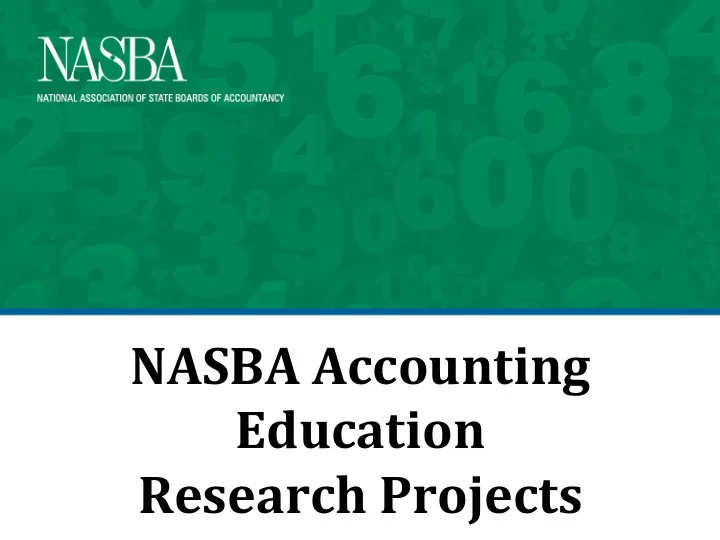

NASBA ¡Accounting ¡ Education ¡ ¡ Research ¡Projects ¡
Research Grants Are Accountants Made or Born? An Analysis of Self-Selection and Performance in the Accounting Major and on the CPA Exam Dr. Allen Blay, CPA and Dr. Martin “Bud” Fennema, CPA
Research Grants State Policies and Attitudes Toward Acceptance of Advanced Placement (AP) Courses and a Comparison of Success on the CPA Exam Between Students That Enter College with Advanced Placement Credit and Those That Do Not: A Two Part Investigation ¡ Dr. Joseph Ugrin, CPA, Dr. John Morris, CPA Dr. Dan Deines, CPA
Research Grants Intention to Sit For the CPA Exam: An Investigation of Cost, Exam, Support and Career Factors ¡ ¡ Dr. ¡Martin ¡Coe, ¡CPA ¡ ¡
Are Accountants Made or Born? An Analysis of Self-Selection and Performance in the Accounting Major and on the CPA Exam Allen Blay and Bud Fennema
An Accounting Question A man buys a horse for $60. He sells the horse for $70. He rebuys the horse for $80. He sells the horse for $90. How much did he make or lose in the horse trading business? Are Accountants Made or Born? Blay and Fennema
Question 1: Self-Selection Do students self-select into the accounting major based on intrinsic ability to make accounting-related decisions and calculations? NO, they do not – students who said that they were going into accounting were no better than others at the accounting-related decisions. However, many students SAID they selected accounting based on natural ability (38%). Are Accountants Made or Born? Blay and Fennema
Question 2: Performance in the Accounting Major and CPA Exam Does performance on accounting-related decisions and calculations predict success in the accounting major beyond intellectual ability? Success in Accounting Coursework: Yes – Students who answering accounting-related questions well got higher grades in principles of accounting and in their upper-level accounting courses. Success at the CPA EXAM: Yes – For AUD, BEC, and REG. No for FAR. Success in all four parts was highly correlated with a student’s grade in their Principles of Accounting course. Are Accountants Made or Born? Blay and Fennema
Question 3: Can “thinking like an accountant” be taught? Do accounting students show improvement in performance by graduation relative to non-accounting students? Some do. Accounting graduates who were originally in the TOP HALF in performing accounting-related tasks got better. Those in the BOTTOM HALF did not improve any more than a non-accounting major. Are Accountants Made or Born? Blay and Fennema
Conclusions • Natural ability to perform accounting-related tasks appears to be highly correlated with success in principles of accounting, other major accounting coursework, and the CPA Exam. • However, it is not correlated with self-selection into the accounting major. • Further, we find no evidence that students lacking the intrinsic ability to “think like an accountant” can be taught that skill. • However, students with an initial intrinsic ability can be trained to be even better. Are Accountants Made or Born? Blay and Fennema
State ¡Policies ¡and ¡A/tudes ¡Toward ¡Acceptance ¡of ¡Advanced ¡ Placement ¡(AP) ¡Courses ¡and ¡a ¡Comparison ¡of ¡Success ¡on ¡the ¡CPA ¡ Exam ¡Between ¡Students ¡That ¡Enter ¡College ¡with ¡Advanced ¡ Placement ¡Credit ¡and ¡Those ¡That ¡Do ¡Not: ¡A ¡Two ¡Part ¡InvesDgaDon ¡ Dr. ¡Joseph ¡Ugrin ¡CPA ¡ Dr. ¡John ¡Morris ¡CPA ¡ Dr. ¡Dan ¡Deines ¡CPA ¡ 2015 ¡Regional ¡Mee:ngs ¡
Conclusions ¡ • There ¡is ¡support ¡for ¡an ¡AP ¡accoun:ng ¡course. ¡ • AP ¡students ¡ul:mately ¡perform ¡beDer ¡on ¡the ¡ CPA ¡exam. ¡ • Students ¡that ¡engage ¡in ¡AP ¡courses ¡that ¡ promote ¡higher ¡order ¡intellectual ¡skills ¡such ¡as ¡ analyzing, ¡evalua:ng, ¡and ¡crea:ng ¡are ¡ par:cularly ¡more ¡successful ¡on ¡the ¡exam. ¡ 2015 ¡Regional ¡Mee:ngs ¡
Part ¡II ¡Results ¡– ¡AP ¡Engagement ¡ 2015 ¡Regional ¡Mee:ngs ¡
Part ¡II ¡Results ¡– ¡AP ¡Exam ¡Success ¡ 2015 ¡Regional ¡Mee:ngs ¡
Key ¡AP ¡Course ¡CharacterisDcs ¡ Develop, ¡Revise ¡ Solve ¡problems, ¡experiment, ¡ interpret ¡results, ¡support ¡ conclusions ¡ Make ¡connecDons, ¡assess ¡ causes ¡and ¡consequences ¡ Blooms ¡Revised ¡Taxonomy ¡ Source: ¡www.mtvernoncsd.org ¡ 2015 ¡Regional ¡Mee:ngs ¡
NASBA ¡Regional ¡Meetings ¡ Martin ¡Coe ¡ June ¡2015 ¡ ¡ 16 ¡
¡ Overall, ¡this ¡study ¡found ¡that ¡exam, ¡support ¡ and ¡career ¡factors ¡all ¡influence ¡a ¡student’s ¡ intention ¡to ¡sit ¡for ¡the ¡CPA ¡exam ¡as ¡soon ¡as ¡ eligible. ¡ ¡ ¡ ¡ This ¡study ¡should ¡help ¡practitioners ¡and ¡ accounting ¡educators ¡better ¡understand ¡and ¡ react ¡to ¡a ¡student’s ¡intention ¡to ¡sit ¡for ¡the ¡ CPA ¡exam ¡as ¡soon ¡as ¡eligible. ¡ ¡ 17 ¡
¡ The ¡largest ¡predictors ¡of ¡a ¡student’s ¡intention ¡to ¡ sit ¡for ¡the ¡CPA ¡exam ¡were: ¡ ¡ § the ¡option ¡to ¡sit ¡for ¡the ¡exam ¡after ¡120 ¡credit ¡hours ¡ § the ¡attractiveness ¡of ¡passing ¡the ¡exam ¡ § social ¡support ¡ § access ¡to ¡a ¡role ¡model ¡ § a ¡protean ¡career ¡attitude. ¡ ¡ Contrary ¡to ¡expectations, ¡cost ¡factors ¡were ¡not ¡ associated ¡with ¡a ¡student’s ¡intention ¡to ¡sit ¡for ¡ the ¡CPA ¡exam. ¡ ¡ ¡ 18 ¡
¡ Inform ¡students ¡of ¡the ¡benefits ¡of ¡being ¡a ¡CPA. ¡ ¡ ¡ Utilize ¡teaching ¡methods ¡that ¡foster ¡student ¡ self-‑efficacy. ¡ ¡ Inform ¡students ¡that ¡the ¡CPA ¡exam ¡can ¡be ¡ taken ¡in ¡a ¡120-‑to-‑sit ¡jurisdiction. ¡ ¡ Increase ¡opportunities ¡for ¡students ¡to ¡interact ¡ with ¡role ¡models. ¡ ¡ ¡ ¡ Help ¡students ¡gain ¡a ¡sense ¡of ¡competency ¡and ¡ self-‑worth. ¡ ¡ Inform ¡students ¡of ¡ways ¡the ¡CPA ¡credential ¡can ¡ be ¡used ¡to ¡manage ¡one’s ¡career. ¡ ¡ 19 ¡
Recommend
More recommend